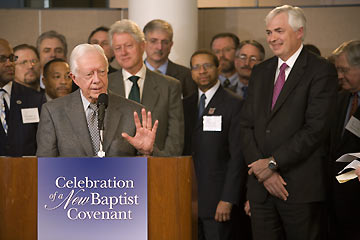ETBU dormitory furnishings find new home, meet multiple needs
Posted: 12/28/07
| East Texas Baptist University, making preparation for the renovation of Fry Hall, donated all the furnishings from the residence hall to Ebenezer Ministries of Clayton. The furniture was loaded onto three semi-trailers, two 16-foot cargo trailers and two 16-foot flat bed trailers, which involved three different ministry organizations to get the donation to its destination in Quemado. (Photo by Mike Midkiff/ETBU) |
ETBU dormitory furnishings find
new home, meet multiple needs
By Mike Midkiff
East Texas Baptist University
MARSHALL—As a dormitory at East Texas Baptist University gets a major facelift, some of its furnishings are finding a new home in Mexican orphanages, and others will meet needs throughout the Southwest, thanks to a cooperative venture involving several ministries.
After students left campus at the end of the fall semester, ETBU physical facilities employees started to work moving furniture out of dorm rooms in preparation for an extensive renovation of Charles Fry Hall, a one-story men’s residence hall built in 1977.
 |
| East Texas Baptist University Utility Technician Michael Welch loads the final piece of furniture onto a truck from the Rick Caywood Ministries of Crawford. ETBU donated all the furnishings from Fry Hall to help needy people in Mexico. (Photo by Mike Midkiff/ETBU) |
But rather than discard, sell or store the furnishings, the school gave them to three organizations that will deliver them to several orphanages in Mexico and to other ministries throughout the Southwest. It’s not the first such donation by the school, but it certainly is the largest.
“About four years ago, Harold Long of Central Baptist Church and the volunteer director of the Soda Lake Baptist Association Ministry Center, helped ETBU coordinate with a ministry that could use our old furniture and mattresses from our residence halls,” said Bob Hogberg, ETBU maintenance manager. But this marks the first time an entire residence hall’s furnishings have been donated.
Eric Wilburn, director of physical facilities at ETBU, contacted Ken Stone, founder and president of Ebenezer Ministries International of Clayton. Stone, who also is pastor of First Baptist Church in Clayton, and Wilburn became friends years ago when Wilburn was pastor of a church in Rusk Panola Baptist Association.
Ebenezer Ministries is a nonprofit charitable organization established for religious purposes and humanitarian aid. Ebenezer receives, processes and delivers food, clothing, medical supplies and equipment to locations worldwide.
“Over the past couple of years, ETBU has called on us to receive and ship mattresses and bed frames from the university,” said Stone. “When this dorm remodeling began to take shape, Eric called to see if we wanted to handle the furnishings.”
In partnership with Central Baptist Church in Marshall, ETBU also helped the ministry with fuel costs for delivery.
“We are just thrilled that we are not going to have to destroy this furniture or try to find a buyer for it,” said Ned Calvert, ETBU vice president for administration and finance. “We understand the high cost of fuel required for the trucks, and we are blessed to help out this ministry to meet needs in Mexico and other areas.”
Stone contacted two other ministries to help with the delivery of such a large donation.
“I called Rick Caywood of Crawford who has a trucking ministry that delivers food along the Mexico Border and Mark Cole of Ministry OPS in Gladewater,” he said.
The entire physical facilities department staff worked to load the furnishings.
“We thought the process of loading the trucks and trailers would take three to four days,” Wilburn said. “Ken shared a short devotion with our department Monday morning before we began to load the furniture. He shared how the furniture would be used to be a blessing in South Texas, Mexico, and possibly a Navajo reservation in New Mexico. This helped the physical facilities staff understand the importance of the project.”
Workers loaded three semi-trailers, two 16-foot cargo trailers and two 16-foot flatbed trailers in one and a half days, Wilburn noted.
“With Ken’s direction, we have delivered two semi-loads of furniture to Steve and Lori Mercer’s Cornerstone Children’s Ranch on the border in Quemado, Texas, near the Mexican border,” Caywood said.
Cornerstone Children’s Ranch meets the physical and spiritual needs of people on both sides of the Mexican border. The ministry has a warehouse, mission quarters and a residence located on 10 acres at Quemado, between Del Rio and Eagle Pass.
“Steve and Lori have already begun to place the gift of surplus furniture in the hands of needy missions in their area,” Caywood said after returning from Quemado.
“It was a blessing that Ebenezer Ministries was willing to take all the furniture and fixtures from Fry Hall,” Wilburn said, reflecting on what was accomplished. “This furniture which would have had to be disposed of in other ways is now a blessing to people in great need.”
“When Christians partner together to further the kingdom of God, the exponential power of God’s blessings is discovered,” Stone added.
News of religion, faith, missions, Bible study and Christian ministry among Baptist churches, in Texas, the BGCT, the nation and around the world.



